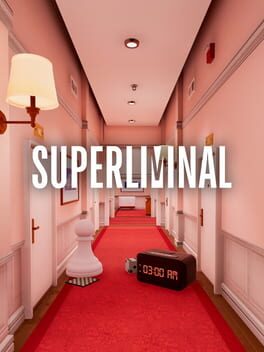Superliminal astonishes me with its mechanics and its adherence to/take on dream logic but sadly leaves a lot to be desired with its difficulty, length, narrative, and failure to truly explore the great mechanics it puts on the table.
The tone of the game doesn’t escape its progenitors in Portal (of which the canceled sequel, F-Stop, Superliminal takes a bunch of its mechanics), but unlike the passive storytelling in both of those games, the story here doesn’t amount to much. It didn’t need to, for the record, and ultimately I think the sole character of Dr. Pierce with a friendly Scottish timbre guiding you the dreamscapes works well, and keeps you grounded as the story and setting works up its grandiloquence and non-adherence to reality. Unfortunately, for all the cool ideas the game sets up (some much cooler than others), it doesn’t spend close to enough time for me to truly appreciate them or even to combine them for even more challenging stuff. I have to hard disagree with everyone in these reviews who says the game wears out its welcome quickly; To me, it felt more like it stopped in for five minutes to say hi and then left again without having a good conversation I valued, even though it was nice to see it, and we had a couple exchanges.
Despite being a puzzle game first, it never really challenged me that much, and by the end it basically ends up as a walking simulator without a great story to back it up. This isn’t always bad, as a lot of the environments are cool or at least as cool as the Unity engine will let them, accidentally jumping the gun on the “liminal space” aesthetic as it was gaining traction, before the pandemic made everyone afraid of pictures of abandoned dentists offices. The chess imagery I felt kinda puzzled by; if there was actually some significance or if it was just a selected iconography the game could associate with.
The soundtrack is a huge standout of the game and not only is super unique but totally cements the game’s unique atmosphere. For most of the time, it’s just piano and nothing else, much in the style of jazz legends like Vince Guaraldi and Dave Brubeck. It’s extremely calming, heartfelt, and reflective, just like the game itself. And even when the game breaks away from the "only piano" approach, it still never strays far from that high quality, even though one particular track near the end felt a little too saccharine.
Side note: any game that gives a content warning for possible triggers for DPDR, as someone who’s suffered hard in the past from the disorder, gets a huge wave of appreciation from me. Though I think, through this, they hype up how “dreamlike” the environments are a bit too highly.
The tone of the game doesn’t escape its progenitors in Portal (of which the canceled sequel, F-Stop, Superliminal takes a bunch of its mechanics), but unlike the passive storytelling in both of those games, the story here doesn’t amount to much. It didn’t need to, for the record, and ultimately I think the sole character of Dr. Pierce with a friendly Scottish timbre guiding you the dreamscapes works well, and keeps you grounded as the story and setting works up its grandiloquence and non-adherence to reality. Unfortunately, for all the cool ideas the game sets up (some much cooler than others), it doesn’t spend close to enough time for me to truly appreciate them or even to combine them for even more challenging stuff. I have to hard disagree with everyone in these reviews who says the game wears out its welcome quickly; To me, it felt more like it stopped in for five minutes to say hi and then left again without having a good conversation I valued, even though it was nice to see it, and we had a couple exchanges.
Despite being a puzzle game first, it never really challenged me that much, and by the end it basically ends up as a walking simulator without a great story to back it up. This isn’t always bad, as a lot of the environments are cool or at least as cool as the Unity engine will let them, accidentally jumping the gun on the “liminal space” aesthetic as it was gaining traction, before the pandemic made everyone afraid of pictures of abandoned dentists offices. The chess imagery I felt kinda puzzled by; if there was actually some significance or if it was just a selected iconography the game could associate with.
The soundtrack is a huge standout of the game and not only is super unique but totally cements the game’s unique atmosphere. For most of the time, it’s just piano and nothing else, much in the style of jazz legends like Vince Guaraldi and Dave Brubeck. It’s extremely calming, heartfelt, and reflective, just like the game itself. And even when the game breaks away from the "only piano" approach, it still never strays far from that high quality, even though one particular track near the end felt a little too saccharine.
Side note: any game that gives a content warning for possible triggers for DPDR, as someone who’s suffered hard in the past from the disorder, gets a huge wave of appreciation from me. Though I think, through this, they hype up how “dreamlike” the environments are a bit too highly.
